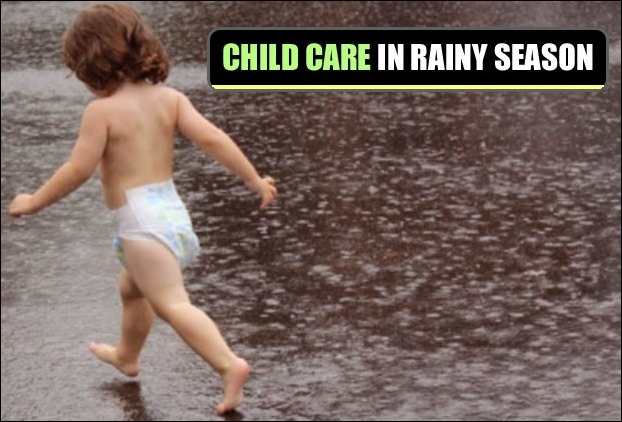
A proper child care in the rainy season needs you to make your surrounding and your child ready for the monsoon.Children are more susceptible to cold and cough during monsoons. They fall ill quickly and because of the damp weather, the cold refuses to go away.
What can we do to ensure that the little ones stay healthy and happy and enjoy the rains?
5 Tips to Child Care In Rainy Season
1.Make Them Immune
Monsoon is the time when people fall sick from water borne diseases. But prevention is always better than cure. So, if you have a little one at home, ensure that he or she is having a proper diet full of Vitamin A and C.
This help to build up the much-needed immune system which will help them to fight cold and flu. If needed, you can also consult your doctor and give them vitamin supplements.
Fresh vegetables and fruits are rich in minerals and nutrients, should be consumed.
2.Prevent From Outside Food
Outside food in the monsoons can be dangerous. Water borne infections like food poisoning and diarrhoea are quite common in the rainy months.
The medium of cooking in outside eateries is not known to us, and is best avoided. Home-cooked food is the best for children during this time. Once in a while, let them indulge in something spicy delicacies like pakoras and chaats, made at home.
Otherwise , home-made items are the best ways to keep your little ones healthy and safe. It is better to include something warm in their diet during monsoon. Hot fluids like warm milk or soup can be a real boon.
3.Avoid Getting Drenched
Children, how much they like to be drenched in rain, should be told specifically that they should not play in the rain. Even if they get drenched, they should give a proper warm bath after they come home. A raincoat and an umbrella should be packed along with their school bags. If needed, and the school permits, an extra change of clothes should be given to them. When you are out during rains, always remember to carry your umbrella. Rain water, especially those in puddles can be really harmful for children. If your little one is complaining of a throat pain, or an ear ache, consult a doctor immediately. It can be more than flu.
4.Keep Your Surroundings Clean
Tell your kids about the various diseases and infections that are common in monsoon. Good habits like washing their hands properly before eating, or cleaning themselves well after they come back from school should be inculcated in children.
Keep your house clean and warm. There is generally a cool breeze with rain and a sudden drop in temperature. Although it feels really nice to stand beside the window and enjoy the cool breeze, it is not really one of the good options.
Keep your house disinfected by cleaning it properly. Monsoon brings mosquitoes and other insects which breed in damp weather. During evenings, when the influx of mosquitoes is common, keep the windows and doors closed. If you have a garden, ensure that there is no stale water or any unclean patch.
5.Precautions To Follow Outdoors
You cannot keep your children at home always. You have to let them play with their friends.
But you can always suggest some good things to them to make them aware. If their friends are having a cold and flu, it is best to avoid them or maintain a distance.
Even if his or her friends encourage him to play in the puddle, ask your child to stay away. Although it is a huge temptation, and at times, the child may succumb, you should make them aware about the problems which might happen if they play in the dirty water.
Always provide proper protection to children when they are going outside. Make them wear proper shoes and dresses like long-sleeved shirts which will protect them from mosquito bites.
If needed, you can also accompany your child to the park to see how they are coping in the monsoon.
Take enough precautions and you will find that children can stay healthy and enjoy the monsoon to the fullest!

Lifebing is driven by an unrelenting passion for promoting health and well-being, our team is wholly committed to curating exceptional content and immersive experiences.
